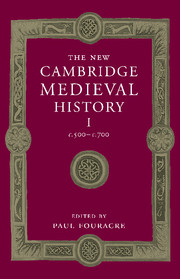Book contents
- Frontmatter
- Introduction: the history of Europe 500–700
- 1 The later Roman Empire
- 2 The Barbarian invasions
- 3 The sources and their interpretation
- PART I THE SIXTH CENTURY
- PART II THE SEVENTH CENTURY
- 11 The Byzantine empire in the seventh century
- 12 Muhammad and the rise of Islam
- 13 The Catholic Visigothic kingdom
- 14 Francia in the seventh century
- 15 Religion and society in Ireland
- 16 Christianity amongst the Britons, Dalriadan Irish and Picts
- 17 England in the seventh century
- 18 Scandinavia
- 19 The Slavs
- PART III THEMES AND PROBLEMS
- List of Primary sources
- Bibliography of secondary works arranged by chapter
- Index
- Frontispiece"
- Plate section"
- Map 3 Gaul/Francia in the sixth and seventh centuries"
- References
17 - England in the seventh century
from PART II - THE SEVENTH CENTURY
Published online by Cambridge University Press: 28 March 2008
- Frontmatter
- Introduction: the history of Europe 500–700
- 1 The later Roman Empire
- 2 The Barbarian invasions
- 3 The sources and their interpretation
- PART I THE SIXTH CENTURY
- PART II THE SEVENTH CENTURY
- 11 The Byzantine empire in the seventh century
- 12 Muhammad and the rise of Islam
- 13 The Catholic Visigothic kingdom
- 14 Francia in the seventh century
- 15 Religion and society in Ireland
- 16 Christianity amongst the Britons, Dalriadan Irish and Picts
- 17 England in the seventh century
- 18 Scandinavia
- 19 The Slavs
- PART III THEMES AND PROBLEMS
- List of Primary sources
- Bibliography of secondary works arranged by chapter
- Index
- Frontispiece"
- Plate section"
- Map 3 Gaul/Francia in the sixth and seventh centuries"
- References
Summary
introduction: the influence of bede
Our picture of England in the seventh century is inescapably dominated by a single source: Bede’s Ecclesiastical History of the English People, completed in 734. That at once lends it vividness and makes it problematic. For Bede was a very skilful and intelligent writer with his own agendas; we know only what he chose to tell us and we have few other written records against which to assess his interpretation of events. Bede’s narrative focusses on what was for him the only significant issue: the progress of Christianity among the English. He constructed it from a very distinctive perspective: to show that his people, the English, the gens Anglorum, and above all his own particular branch of that people, the Northumbrians, had been called by God to a special role in the history of salvation. They were a new Israel, charged with mission – to spread true faith and observance among their insular and continental neighbours. In Bede’s view, in his own day they had fallen away from that vocation and had to be recalled to the right path. The Ecclesiastical History was overwhelmingly coloured by these concerns. It avoided difficult contemporary events and focussed on the glorious and exemplary recent past – the seventh century past – of the English (and especially the Northumbrians), showing how they received and spread the Christian faith under the leadership of kings and pastors who lived up to their high calling.
Keywords
- Type
- Chapter
- Information
- The New Cambridge Medieval History , pp. 462 - 495Publisher: Cambridge University PressPrint publication year: 2005
References
- 5
- Cited by

